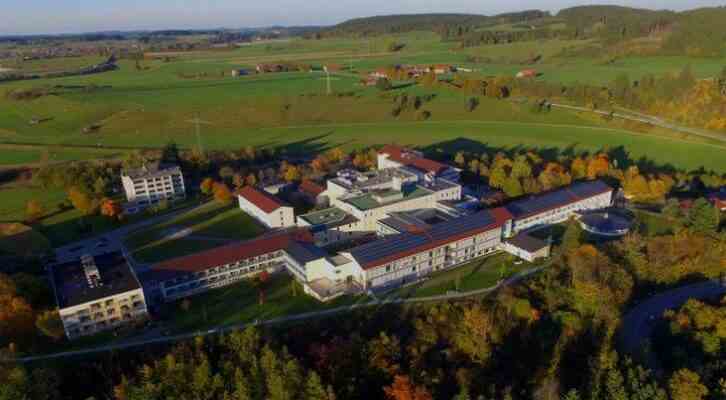Two days after the referendum, the Weilheim-Schongau district administrator was still shocked: “I haven’t slept since Sunday,” said Andrea Jochner-Weiss (CSU) on Tuesday. With 67.2 percent, the citizens had spoken out against the construction of a central hospital and for the continued operation of the loss-making hospitals in Weilheim and Schongau. A clear political requirement that will hardly be met in practice, because the two clinics in the district are already working at the limit in terms of staff and finances.
Thomas Lippmann, managing director of the municipal hospital GmbH, sees himself in an “incredibly difficult” situation, especially since the vast majority of employees had hoped for a new central hospital to be built. “My job is to keep them on board now,” announced Lippmann. For the staff, the decision means that they must continue to commute back and forth between the two locations in order to keep operations running. Two emergency rooms, two surgeries – the logistics in the Weilheim district are complex and expensive.
The outcome of the referendum was carefully noted by experts throughout Bavaria, mostly with concern that it could have a signal effect. Jochner-Weiss also suspects that: “I’m so sorry that we are such a negative example for the other districts.” Because there are also problems with the hospitals elsewhere: there are also debates about a new central clinic in the extreme south-east of Bavaria, where the two districts of Berchtesgadener Land and Traunstein have combined their hospitals in 2009 in a joint stock company called Kliniken Südwestbayern. The main clinic of the group in Traunstein is currently being rebuilt in sections, the two houses in Trostberg and Ruhpolding focus on geriatric medicine and pain medicine.
At the same time, the clinic company, together with the Berchtesgadener Land, is planning to replace the clinic in Bad Reichenhall, which was only built in the 1990s, with a central clinic for the district, which is to be built at a different location in the district town. The two hospitals in Berchtesgaden and Freilassing are said to specialize, which among other things makes their support associations fear that patients will be cared for close to home. They demand that at least one emergency room be maintained in both places and had recently collected enough signatures for the district council to deal with the issue again in the fall. Although he stuck to his plans, the critics have so far refrained from holding a referendum as in the Weilheim-Schongau district.
A case in Middle Franconia is somewhat different. There, the diaconal healthcare company Diakoneo recently examined options for integrating the Neuendettelsau clinic into the Schwabach gGmbH clinic at the turn of the year. For “legal reasons”, according to the clinic management, this has shattered. However, since the operation of the clinics cannot continue as before due to “crisis conditions”, drastic consequences are now threatening in rural West Central Franconia. Although one continues to fight for “offering inpatient medical care at both locations,” emphasizes Diakoneo. But consider “other models” if this doesn’t work.
The action group “Stop dying in hospitals in Bavaria” sees another Franconian hospital in acute danger. If the idea of ”conversion into outpatient care, short-term care and health kiosk” prevails, former clinic director Klaus Emmerich fears a “second Hersbruck case” in Neuendettelsau. If inpatient surgical emergency medicine were no longer offered in Neuendettelsau, patients would see the clinic as “too narrow-minded”. What would be tantamount to a vicious circle: “Fewer patients, less income”, in the end the clinic in Neuendettelsau was threatened with existential danger. She would not be the first to experience this in Middle Franconia. In 2019, the hospital in Hersbruck closed its doors after more than 100 years. A clinic spokesman emphasizes that it has not yet been decided how things should continue in Neuendettelsau.
Roland Engehausen, Managing Director of the Bavarian Hospital Society, sees the existence of a number of Bavarian hospitals threatened if the federal government implements the reform plans presented at the beginning of the week. Many houses could not meet the requirements listed therein, which would lead to extreme pressure on the nationwide supply. That’s why he regretted the vote against a modern central clinic in Weilheim. “You can’t save a hospital with a referendum,” Engehausen told the SZ. “We have a full supply claim in the population, without knowing what it costs and who pays for it.” In the district of Weilheim-Schongau, an opportunity was missed to tackle structural change actively and at an early stage. Like Engehausen, Lippmann now fears that there will be an “uncontrolled concentration process” among the clinics in Bavaria.
District Administrator Andrea Jochner-Weiß (CSU) has failed with her plans for the central clinic for the time being. The topic of the hospital is very emotional, she said.
(Photo: Alessandra Schellnegger)
District Administrator Jochner-Weiss now wants to look for a way out of the muddled situation at the beginning of next year. This is likely to be difficult because the citizens’ initiative for the Schongau hospital has already announced that it will seek another decision if the district continues to pursue the central hospital project after a year of planning freezes. Can two houses be preserved in the long term? Jochner-Weiss has serious doubts here: “Today, doctors and nurses choose their hospital themselves,” she says. In other words, one of the two clinics may have to give up at some point due to a lack of staff.

